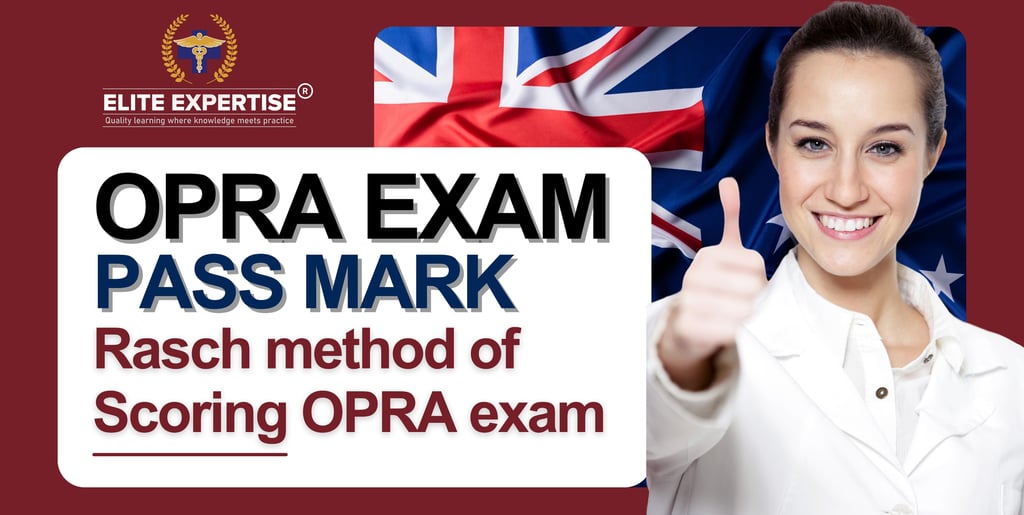ASK MY PHARMACIST | GOT QUESTIONS? Your pharmacist has answers. Click Here
OPRA Exam Pass Mark: Rasch method of Scoring OPRA exam
Understand the OPRA pass mark and Rasch methodology for overseas pharmacists aiming to practice in Australia. Learn how scoring works and how to prepare
Arief Mohammad
2/25/20255 min read


Are you a pharmacist? Are you aspiring to move overseas after you B.Pharm, M.Pharm, or PharmD but unable to decide which country is the best country suitable for a pharmacy career? Then I would suggest Australia is one of the best countries for pharmacists abroad. Starting your journey to become a pharmacist in Australia is both a worthy and challenging attempt. For overseas-trained pharmacists, knowing the pathway to registration in Australia is crucial. The Australian Pharmacy Council (APC) has recently introduced the Overseas Pharmacist Readiness Assessment (OPRA) exam, which was initially called the Knowledge Assessment of Pharmaceutical Sciences (KAPS) exam. This change creates a shift towards a stronger and fairer examination, ensuring that pharmacists are well-prepared to serve the Australian healthcare system.
Why Choose the OPRA Exam?
Australia's healthcare system is known for its top-tier standards, and pharmacists play a very important role in sustaining these standards. For pharmacists abroad, the OPRA exam serves as a doorway to determine their capability and readiness to practice in Australia. Successfully clearing this OPRA exam not only opens doors to professional opportunities but also ensures that pharmacists are equipped to provide quality care in a diverse healthcare environment.
KAPS Exam to OPRA Exam Changes: KAPS Exam Vs OPRA Exam:
The KAPS exam has been the evaluating exam for many years now. However, to catch up to the evolving standards of Australian healthcare, the APC has now replaced LAPS exam with OPRA exam, which focuses on more practical aspects like patient care and therapeutics, etc.
Refer to : https://www.eliteexpertise.com.au/
Key Differences Between KAPS and OPRA:
Assessment Focus: The main focus of KAPS exam was into theoretical knowledge, which has changed to OPRA exam from this March 2025, with focus on both the skills like practical and the theory
Scoring Methodology: The OPRA exam uses the Rasch methodology, a sophisticated psychometric model that makes sure that all the different versions of the exam maintain fairness and consistency. This method provides a more precise measure of a candidate's abilities.
Exam Structure: The OPRA exam is more focused and tests the key skills needed to work as a pharmacist in the Australian health care system.
OPRA Exam Fee
Before jumping into the journey of becoming a pharmacist abroad, its always better to have an understanding of the financial commitment. As per the latest information from the APC website, the OPRA exam fee is AUD 2,190. For candidates in India, this is approximately INR 1,21,000, depending on the current exchange rate as of 24 February 2025. There has been a reduction in the fees, which were previously 2,290 AUD for the KAPS exam, which is good news for the OPRA aspirants.
NOTE: It's always advisable to check the official APC website for the most up-to-date fee structure.
OPRA Exam Format and Structure
The OPRA exam is a
Computer-based assessment
Closed book (indicating no reference books allowed in the OPRA exam centers)
Comprising 120 multiple-choice questions
Duration of the OPRA exam is 2.5-hours
The questions are designed to evaluate a range of competencies, from foundational pharmaceutical knowledge to practical problem-solving skills relevant to the Australian healthcare context.
Upcoming Exam Dates
The very first OPRA exam is going to be held on March 3rd, 2025.
If you were already aware of the date and have prepared well for the upcoming OPRA exam in March, well, good for you!
However, for candidates who have recently become aware of this opportunity, appearing for the March exam might be difficult.
The APC typically offers multiple exam sessions throughout the year. Here are the exam dates from the APC website:
Preparation Timeline
Preparing for the OPRA exam requires a strategic approach. A preparation period of 3 to 6 months is generally sufficient, depending on individual backgrounds and study habits. This timeframe allows candidates to thoroughly understand the exam content, familiarize themselves with the question formats, and engage in ample practice sessions. This preparation is made easy by Elite expertise for you.
Elite Expertise: Your Partner in Success
At Elite Expertise, we are committed to guiding overseas pharmacists through their journey to practice in Australia. Our platform offers comprehensive preparation courses curated specifically for the OPRA exam.
Our Track Record:
Our success speaks volumes, and it speaks for itself. With a 95% success rate in the previous KAPS exams, our methodologies and resources have consistently empowered candidates to achieve their goals.
Expert Trainers:
Our team comprises seasoned professionals like Harika Bheemavarapu and Areif Mohammad, both accredited consultant clinical pharmacists in Australia. Their firsthand experience and insights into the Australian healthcare system provide candidates with invaluable guidance, ensuring they are well-prepared for both the exam and their future roles.
What is the OPRA Exam Pass Mark?
There is no specific pass mark for the OPAR exam. It differs for every candidate, and the results are published by the APC, indicating only pass or fail. To further understand your OPRA scoring, get to know your background about the Rasch methodology of scoring, which was previously used in COAP and intern exams but now in the OPRA exam too.
Understanding the OPRA Exam Scoring
The OPRA exam utilizes the Rasch scoring methodology, a model that ensures fairness and consistency across different exam versions.
What is the Rasch Methodology?
The Rasch model is a psychometric approach that analyzes both the difficulty of exam questions and the ability of candidates. Unlike traditional scoring systems that might simply tally correct answers, the Rasch model provides a scaled score, reflecting a candidate's performance relative to the exam's difficulty.
Key Features of Rasch Scoring:
Fairness Across Exam Versions: By calibrating question difficulties, the Rasch model ensures that all candidates are assessed equitably, regardless of the specific set of questions they encounter.
Ability-focused Assessment: The model evaluates a candidate's ability level, ensuring that the score accurately reflects their competence rather than just their test-taking skills.
Evidence-Based Standards: Passing scores are determined through rigorous psychometric analyses involving subject matter experts, ensuring that the benchmarks are both fair and reflective of the competencies required for practice.
It's important to note that the APC does not provide specific exam scores to candidates. Instead, results are communicated as pass or fail, based on whether the candidate has met the established passing standard. This approach emphasizes competence and readiness for practice over numerical scores.
APC works with experts to ensure the OPRA exam is fair and reliable. The exam has 120 questions, with 90% being scored and counting toward your result. The remaining 10% are unscored and used for testing purposes. These unscored questions can be from any topic and are spread evenly across all five content areas. You won’t know which questions are scored and which are not.
Preparing with the Rasch Model in Mind
Understanding the nuances of the Rasch scoring methodology can enhance your preparation strategy:
Consistent Performance: Aim for consistent accuracy across all questions, as the model assesses overall ability rather than isolated correct answers.
Focus on Understanding: Deep comprehension of topics is crucial. Superficial memorization might not suffice, as questions are designed to assess practical application and critical thinking.
Practice with Purpose: Engage in practice exams that mirror the OPRA format. This not only familiarizes you with the question styles but also helps in building the stamina required for the 2.5-hour exam duration.
Conclusion
Transitioning to a professional practice in Australia as an overseas pharmacist is a commendable goal, and the OPRA exam is a pivotal step in this journey. Understanding the exam's structure, scoring methodology, and effective preparation strategies can significantly enhance your chances of success.
This blog is for informational purposes only and reflects our own views and interpretations. While we strive for accuracy, guidelines and requirements may change. Readers are advised to verify information with official sources such as the Australian Pharmacy Council (APC) and Ahpra before making any decisions. We do not take responsibility for any actions taken based on the information provided.
⚠️ Disclaimer


About the Author
Arief Mohammad
Mr. Arief Mohammad is renowned for his excellent teaching skills and practice-based experience, which can contribute to developing practice-based knowledge for a learner. He has been a practicing pharmacist in Australia for the last 5 years and has been a preceptor to several students and intern pharmacists.
Follow On
Accredited Consultant Pharmacist
Australia
Follow Us
+91 76750 84909
Privacy Policy | © 2025 Elite Expertise . All Rights Reserved.
ELITE EXPERTISE PTY. LTD (ABN: 15668292439) (ACN: 668292439)
Australian Statutory Education License: OPP 2025 ELITE EXPERTISE PTY. LTD
Disclaimer
Elite Expertise is an online education platform dedicated solely to providing coaching and preparation services for the OPRA, PEBC, PSI and PTE exams. We do not offer any sponsorship or migration services. All information provided on our platform is for educational purposes only and should not be interpreted as legal or immigration advice. For inquiries regarding sponsorship, visa applications, or migration services, please consult with licensed immigration professionals or relevant authorities.
Elite Expertise is a trusted and results-driven training platform specializing in preparation for international pharmacist licensing exams. Our comprehensive courses, expert instructors, and proven methodologies have helped countless pharmacy professionals achieve their goals and succeed in competitive regulatory exams. We are proud of our strong success rate and commitment to excellence.
Elite Expertise is an independent training provider. We are not affiliated with any global pharmacy regulatory authorities or official exam-conducting bodies.
Copyright © 2026 Elite Expertise. All rights reserved.
Address
Unit 1/73 Beverley St, Doncaster East VIC 3109, Australia
